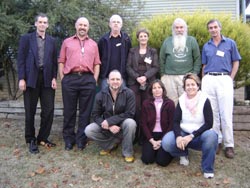
Plant biosecurity - taking the lead

New Zealand Ministry of Agriculture and Fisheries and Queensland Department of Primary Industries representatives received training recently from ASCU staff including Unit Director, Dr Murray Fletcher (top row, second from right), Manager, Peter Gillespie (red shirt) and Herbarium Curator, Dr Michael Priest (centre, back).
The expertise of NSW Department of Primary Industries researchers in fruit fly diagnostics and fungal identifications has been recognised in Australia and overseas, following international accreditation of the plant health diagnostic laboratory at Orange.
An estimated 1.2 million fruit flies and up to 150 fungi are examined each year at the NSW Agricultural Scientific Collections Unit (ASCU)’s laboratory in Orange to ensure species which threaten the biosecurity of Australia’s agricultural industries are identified accurately and promptly.
Recently, the ASCU laboratory became the first in Australia to be accredited at ISO17025 international standard for both fungal identifications and fruit fly diagnostics.
Similar agencies in New Zealand and Queensland are currently seeking this level of accreditation and training has been provided for them at the DPI facility.
Collections Unit manager, Peter Gillespie, said the ISO accreditation “sets internationally accepted standards for key technical people and shows that unit staff have a high level of competence.
“It means we can provide the NSW and Federal Government with confidence in the work that we do, and that we do it in a timely and repeatable manner.”
Each year about 18 different species of fruit fly are identified from the 1.2 million specimens captured in 300 traps, located mostly in Sydney, Newcastle, Wollongong and Coffs Harbour.
The aim is to ensure protection for the State’s horticultural industries by ensuring species currently not found New South Wales, such as the Mediterranean fruit fly, do not enter the State.
Up to 150 fungi specimens, mostly rusts, smuts and many other fungi cultivated from leaf spots, root rots and other diseased plant material, are examined to ensure that species that could threaten agricultural industries are not present in Australia.
Email:

